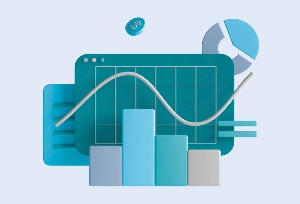Technologies that help to get accurate business insights in real time, automate traditional finance operations, and support faster decision making at the executive level show how digital CFOs are transforming finance. Finance officers have to keep embracing new technologies in the workplace to increase efficiency as well as visibility, which, in turn, result in substantial quick wins in all responsibilities undertaken by finance chiefs and their teams.
As of 2018, 25% percent of finance executives have already leveraged automated tools for forecasting and budgeting. In 2019, 42% of the finance officers had adopted the technologies signifying a 17% revenue increase. The trend is expected to continue given that 90% of respondents (working at firms with over $100 million revenue) said that they intend to leverage these tools in the future.
With that said, let’s cover the actual technologies that finance executives need for success.
Digital Analytics
Jeff Thomson, a CFO insight writer, in an article on Forbes, said that “ Finance will become increasingly dependent on automation and analytics to deliver real-time, clear, actionable and forward-looking insights.”
Therefore, soon, dealing with uncertainty and volatility will become a norm for the finance sector. As such, there is a need for finance function transformation to ensure companies become more effective at obtaining forward-looking insights from data while monitoring new information and incorporating it into financial models. With data analytics tools, finance officers can utilize big data platforms via machine learning to analyze big sets of information. Thus, they can make detailed predictions on an array of issues, for example, how a specific asset is expected to behave on a balance sheet.
Apart from that, data analytics also allows finance officers to combine both unstructured and structured data, for example, web monitoring and social media, to determine questionable activities, trends and patterns, hence allowing for the mitigation of potential risks such as cyber-attacks and fraud.
With such benefits to gain, more and more finance officers are embracing digital analytics in their operations. A recent survey found that 23% of finance officers consider enhancing data and analytics functions to transform risk management, comprehension of value drivers, and forecasting to be their top priority.
Robotic Process Automation (RPA)
By embracing CFO digital transformation, finance executives will be able to leverage the power of robotic process automation. Shifting to RPA will result in success in the workplace by enabling finance officers to accomplish the following easily:
- Automation of essential finance functions, including data reporting and payments: RPA can help streamline corporate reporting by presenting and accessing data from different systems.
- Identification system inefficiencies: Robotic process automation will bridge the gap between various ERP systems if a company lacks a single integrated system. Apart from that, RPA can be used as an interface between critical legacy systems and an ERP.
- Enhancement of speed and quality of finance functions: Robotic process automation helps finance executives get clear audit trails, thus making it easier to comply with regulatory standards.
But even as finance officers use robots, it is essential to note that human involvement needs to be maintained.
Cloud Technology and SaaS (Software-As-A-Service)
Here is another technology that finance executives need to pay attention to as far as digital transformation and the finance function go in hand. With cloud technology, finance officers can steer organizational success by accessing data in real-time and implementing collaborative working.
SaaS too will foster digital finance transformation. When used in combination with cloud technology, businesses stand to benefit from greater flexibility, reduced costs, and more streamlined operations.
Artificial Intelligence (AI)
The roles of AI cannot be ignored in the digitalization in finance. These systems can take instructions and information, learn from human behavior, and tackle questions or situations in a human-like manner.
AI also complements RPA and other technologies, thus transforming the various functions of finance officers. Artifice intelligence applications can be trained to analyze tax regulations, absorb new rules as they are launched, offer useful advice, and respond to various queries.
Even though nowadays, AI plays an essential role in finance in a digital world, there still will be the need for human insight and experience. Loren Williams, a Chief Data Scientist, notes that “…but with big, important and complex decisions, you may see AI systems providing advice or recommendations to help the human decision-maker, and back up those recommendations based on its ability to gather, ingest and make sense of vast amounts of structured and unstructured data.”
Blockchain
Blockchain is yet another vital technology in CFO digital transformation. It can help finance executives steer success by:
- Increasing IT security given that blockchains are often foolproof, hence excellent for preventing hacking and fraud.
- Managing big value chains well: With this tech, finance officers can access data from different blockchains and use it to develop their record systems.
- Improving contract enforcement by taking advantage of blockchain’s programmability to pay for services after they are completed.
Final Word
It is noteworthy to comment that new technologies are going to replace old practices for good. As such, it makes total sense for finance teams to implement and take advantage of these and other technologies in their operations. Contact inVeritaSoft to apply these technologies in your financial business today!





_1758804763-small.webp)
